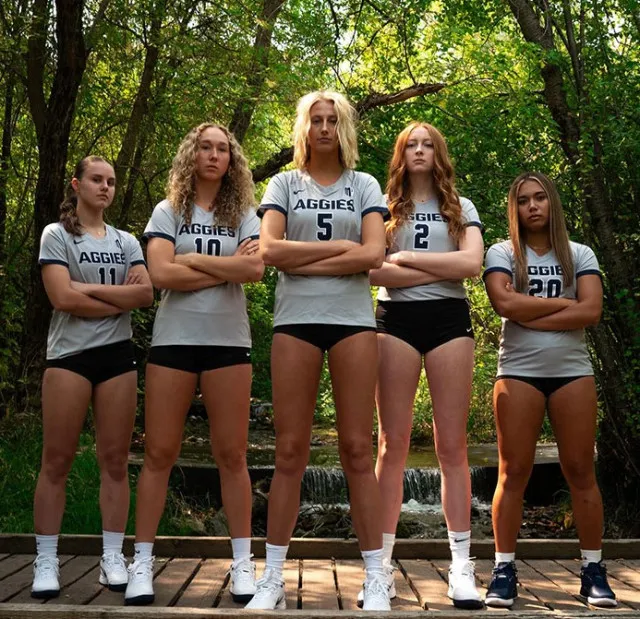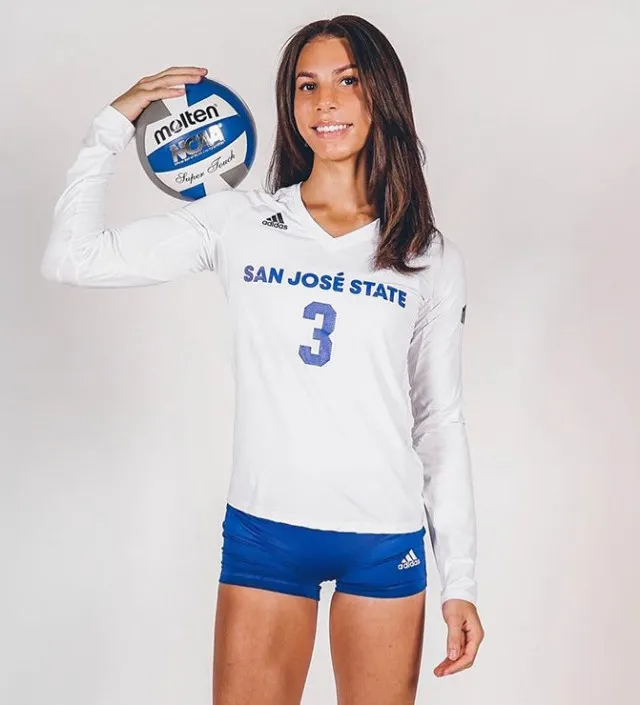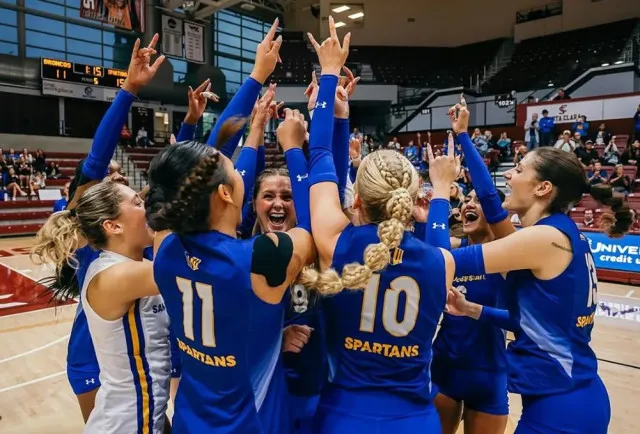In an incident that has ignited intense debate, the women’s volleyball team from Utah State University recently chose to forfeit their scheduled match against San Jose State University. The decision was prompted by the participation of Blaire Fleming, a transgender athlete competing for San Jose State. This move has raised complex questions about fairness, inclusion, and the future of women’s sports.
Blaire Fleming: A Key Player on the San Jose State Team

Blaire Fleming, a senior player for San Jose State, has become one of the standout performers for her team. With three seasons of experience, Fleming has proven her skills on the court, becoming a crucial asset to her team’s success. So far this season, she has helped San Jose State win all ten of their matches, ranking as the second-best player with 118.5 points and 103 kills.
Fleming’s journey has not been without challenges. After transferring from Coastal Carolina University, which barred her from competing on the women’s team, she found a new opportunity at San Jose State. Her presence on the court, however, has become a focal point of controversy, leading to disputes over what constitutes fairness in women’s sports.
Utah State’s Decision: A Stand for Fairness or Exclusion?
Utah State’s decision to forfeit the match was a significant one. In a public statement, the university cited their commitment to maintaining fairness in women’s athletics as the primary reason for their refusal to compete. The scheduled match, set for October 23, 2024, was officially canceled by the university.
“Utah State University will not participate in its scheduled October 23, 2024, volleyball match at San Jose State University,” read the official statement. “The University will abide by Mountain West Conference policy regarding how this match is recorded.”
The decision aligns with actions taken by other institutions, such as Southern Utah, Boise State, and the University of Wyoming, all of which have opted out of competing against San Jose State under similar circumstances.
Governor Spencer Cox Backs Utah State’s Stance
Governor Spencer Cox of Utah expressed support for Utah State’s decision, emphasizing the importance of preserving fair competition in women’s sports. He criticized the current NCAA policies, claiming they do not adequately protect female athletes.
“Our female athletes are left grappling with this difficult issue because the NCAA has failed in its responsibility to protect female athletes and women’s sports,” Governor Cox stated. He urged the NCAA to take a more active role in addressing these concerns, advocating for a solution that ensures a level playing field for all competitors.
San Jose State Responds: Advocating for Inclusion and Compliance
San Jose State responded to the forfeiture with a statement expressing disappointment over the decision. The university reaffirmed its commitment to adhering to NCAA and Mountain West regulations, emphasizing the need for inclusivity in sports.

“It is disappointing that our SJSU student-athletes, who are in full compliance with NCAA and Mountain West rules and regulations, are being denied opportunities to compete,” the statement read. “We are committed to supporting our student-athletes through these challenges and in their ability to compete in an inclusive, fair, safe, and respectful environment.”
The controversy surrounding Fleming’s participation has not only affected the teams involved but has also sparked broader conversations about the role of transgender athletes in women’s sports.
Teammates Speak Out: Concerns About Fair Play and Safety
While Fleming’s skills have undoubtedly contributed to San Jose State’s success, her presence has led to concerns among players, particularly her own teammates. Brooke Slusser, a member of the San Jose State team, voiced her apprehensions about competing alongside a player whom she believes has inherent physical advantages due to biological sex.
Slusser noted that Fleming’s spikes often exceed speeds of 80 mph, faster than the average spike in women’s volleyball. “The girls were doing everything they could to dodge Fleming’s spikes but still could not fully protect themselves,” Slusser shared in a lawsuit that alleges safety concerns in games featuring transgender athletes.

Fleming’s height, standing at 6 feet 1 inch, has also contributed to these dynamics, creating a physical presence that some players find challenging to compete against.
The Broader Debate: Fairness vs. Inclusion in Women’s Sports
The incident involving Utah State and San Jose State is not an isolated one. It is part of a broader, ongoing debate about the inclusion of transgender athletes in women’s sports. Advocates for inclusion argue that transgender athletes, like all athletes, deserve the opportunity to compete in a safe and supportive environment. They emphasize the importance of following established guidelines set by governing bodies such as the NCAA, which permit transgender athletes to compete under certain conditions.
On the other side, critics claim that biological differences create an uneven playing field, potentially disadvantaging cisgender women athletes. They call for clearer regulations and policies to ensure fair competition while also respecting the rights of all athletes.
The NCAA’s Role: A Call for Clearer Guidelines
The NCAA has faced mounting pressure to clarify its policies regarding transgender athletes. As more incidents like this one arise, universities, athletes, and governing bodies are demanding a more comprehensive approach. The current guidelines allow transgender women to compete in women’s sports after meeting specific hormone treatment requirements. However, opponents argue that these rules do not adequately address physical differences that may remain despite hormone therapy.

Governor Cox’s call for the NCAA to “protect female athletes” reflects the growing sentiment that existing policies may need revision. Whether this leads to changes in NCAA guidelines or further legal battles remains to be seen.
Conclusion: Balancing Fairness and Inclusion in Women’s Sports
The decision by Utah State University to forfeit their match against San Jose State University has reignited the complex discussion around transgender athletes in women’s sports. While the move highlights concerns about fairness and safety, it also underscores the need for more inclusive policies that protect the rights of all athletes. As universities, athletes, and governing bodies continue to navigate this evolving landscape, the challenge will be to find a balance that upholds both competitive integrity and the values of inclusion.


